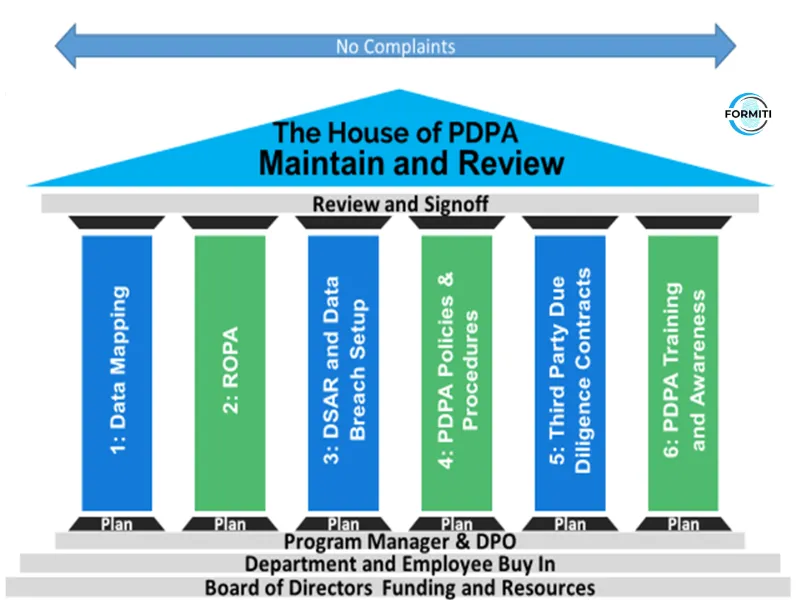Introduction
In today’s digital age, data is the lifeblood of business operations. With the rise in data breaches and privacy concerns, companies must adopt robust data protection measures to ensure their operations comply with relevant regulations. The Personal Data Protection Act (PDPA) is the cornerstone of data privacy in Thailand. Companies must focus on The 6 Pillars of Thailand’s PDPA Compliance to achieve and maintain PDPA compliance.
1. Data Mapping:
The first step in achieving PDPA compliance is understanding your data. Companies need to map their data landscape comprehensively. This includes identifying the types of data they collect, process, and store and its location. With this foundation, it’s easier to implement effective data protection measures.
2. Record of Processing Activities:
Creating a detailed record of processing activities is mandatory under the PDPA. This record serves as a record of all data processing activities within an organisation. It should include details like the purpose of data processing, data categories, recipients, and international data transfers. A well-maintained record helps in audits and demonstrates accountability. There are important exemptions
3. Data Subject Access Requests (DSAR) and Data Breach Management:
Under the PDPA, individuals can access their personal data and request corrections or erasure. Companies need to have mechanisms in place to handle DSARs promptly. Equally important is having a robust data breach management plan to respond to and report data breaches within the mandated timeframe. Timely and transparent responses are essential to maintaining trust.
4. PDPA Policies and Procedures:
Clear and comprehensive PDPA policies and procedures are a necessity. These documents define how the organisation handles, protects, and access data. Policies should cover data classification, retention, and data protection measures. Regularly updating these policies is vital to stay in line with regulatory changes.
5. Third-Party Due Diligence Assessment and Contracts:
When working with third-party vendors or service providers, assessing their PDPA compliance is crucial. Companies should ensure these partners follow PDPA principles and establish clear contracts defining data processing responsibilities and safeguards. A breach by a third party can still result in liability for your organisation.
6. PDPA Training and Awareness:
Employees are the front line of defence and a potential weak link regarding data protection. Comprehensive training programs are essential to raise awareness about data privacy and PDPA compliance. Regular training helps employees recognise risks, adhere to policies, and respond appropriately to data privacy incidents.
In summary, ensuring PDPA compliance in Thailand involves a multi-faceted approach, with these six pillars forming the foundation. Companies can build a robust and resilient data privacy framework by conducting thorough data mapping, maintaining a registry of processing activities, efficiently handling DSARs and data breaches, implementing clear policies and procedures, conducting third-party due diligence, and prioritising training and awareness.
Compliance with the PDPA isn’t just about meeting legal obligations; it’s about safeguarding customer trust, protecting your brand, and mitigating risks associated with data breaches and regulatory non-compliance. As Thailand’s data privacy landscape evolves, companies prioritising these six pillars will achieve PDPA compliance and stay ahead of emerging privacy challenges.
Formiti delivers Thailand PDPA Services for Thai and International Companies processing the data of Thailand individuals and for Thailand International Schools.

